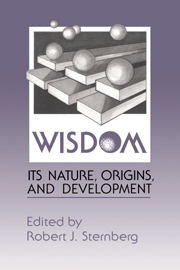Book contents
- Frontmatter
- Contents
- List of contributors
- Preface
- Part I Approaches to the study of wisdom
- Part II Approaches informed by philosophical conceptions of wisdom
- Part III Approaches informed by folk conceptions of wisdom
- 5 Toward a psychology of wisdom and its ontogenesis
- 6 Wisdom in a postapocalyptic age
- 7 Wisdom and its relations to intelligence and creativity
- 8 The study of wise persons: integrating a personality perspective
- Part IV Approaches informed by psychodevelopmental conceptions of wisdom
- Part V Integration of approaches and viewpoints
- Name index
- Subject index
8 - The study of wise persons: integrating a personality perspective
Published online by Cambridge University Press: 05 June 2012
- Frontmatter
- Contents
- List of contributors
- Preface
- Part I Approaches to the study of wisdom
- Part II Approaches informed by philosophical conceptions of wisdom
- Part III Approaches informed by folk conceptions of wisdom
- 5 Toward a psychology of wisdom and its ontogenesis
- 6 Wisdom in a postapocalyptic age
- 7 Wisdom and its relations to intelligence and creativity
- 8 The study of wise persons: integrating a personality perspective
- Part IV Approaches informed by psychodevelopmental conceptions of wisdom
- Part V Integration of approaches and viewpoints
- Name index
- Subject index
Summary
The primacy of cognitive explanations of wisdom in recent research has failed to incorporate personality prerequisites. Fundamental links between wisdom and adult personality development, elucidated by several personality theorists, are summarized in the first part of this chapter. We identify two key indicators of personality-based wisdom: advanced self-development and selftranscendence. Wisdom depends on an unusually integrated personality structure that enables people to transcend personalistic perspectives and embrace collective and universal concerns. We assume, however, that these personality attributes presuppose complementary cognitive development and that wisdom is rare precisely because it entails both exceptional personality and cognitive growth.
In the second part of this chapter, we propose an empirical approach to the study of wisdom that capitalizes on the integration of personality and cognition by intensively studying adults who are considered wise. In this approach, subject selection is guided by nominations of wise people and measure selection is guided by both cognitive and personality theories. We elaborate how this approach can be applied to the study of wisdom by discussing useful ingredients from several other research traditions. Finally, we provide an empirical foundation for the study of wise people by summarizing current research.
Personality conceptualization of wisdom
Hypotheses about a personality dimension of wisdom can be drawn from three personality theorists who have dealt explicitly with wisdom: Erikson, Jung, and Kohut. Although these theorists have different orientations to personality (i.e., Erikson's psychosocial, Jung's analytical, and Kohut's object relations), each discussed self-development and self-transcendence as key attributes of the wise personality.
- Type
- Chapter
- Information
- WisdomIts Nature, Origins, and Development, pp. 160 - 178Publisher: Cambridge University PressPrint publication year: 1990
- 75
- Cited by



